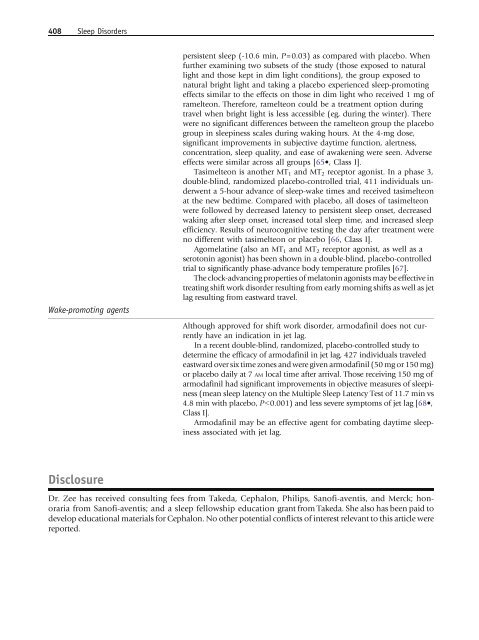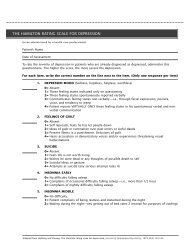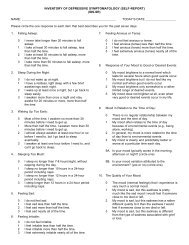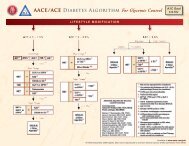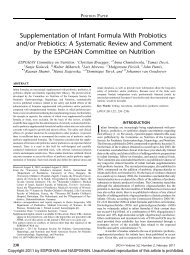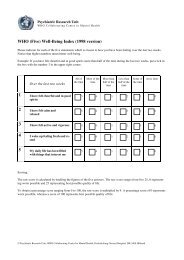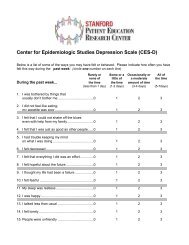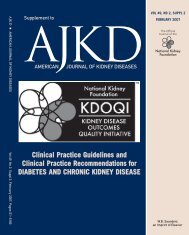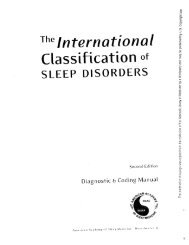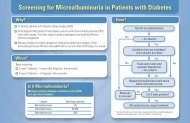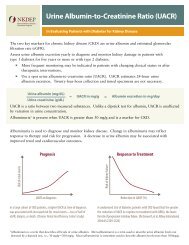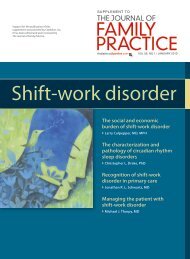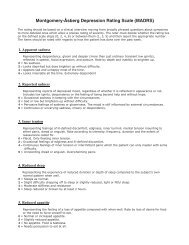408 Sleep DisordersWake-promoting agentspersistent sleep (-10.6 min, P=0.03) as <strong>com</strong>pared with placebo. Whenfurther examining two subsets of the study (those exposed to naturallight and those kept in dim light conditions), the group exposed tonatural bright light and taking a placebo experienced sleep-promotingeffects similar to the effects on those in dim light who received 1 mg oframelteon. Therefore, ramelteon could be a treatment option duringtravel when bright light is less accessible (eg, during the winter). Therewere no significant differences between the ramelteon group the placebogroup in sleepiness scales during waking hours. At the 4-mg dose,significant improvements in subjective daytime function, alertness,concentration, sleep quality, and ease of awakening were seen. Adverseeffects were similar across all groups [65•, Class I].Tasimelteon is another MT 1 and MT 2 receptor agonist. In a phase 3,double-blind, randomized placebo-controlled trial, 411 individuals underwenta 5-hour advance of sleep-wake times and received tasimelteonat the new bedtime. Compared with placebo, all doses of tasimelteonwere followed by decreased latency to persistent sleep onset, decreasedwaking after sleep onset, increased total sleep time, and increased sleepefficiency. Results of neurocognitive testing the day after treatment wereno different with tasimelteon or placebo [66, Class I].Agomelatine (also an MT 1 and MT 2 receptor agonist, as well as aserotonin agonist) has been shown in a double-blind, placebo-controlledtrial to significantly phase-advance body temperature profiles [67].The clock-advancing properties of melatonin agonists may be effective intreating shift work disorder resulting from early morning shifts as well as jetlag resulting from eastward travel.Although approved for shift work disorder, armodafinil does not currentlyhave an indication in jet lag.In a recent double-blind, randomized, placebo-controlled study todetermine the efficacy of armodafinil in jet lag, 427 individuals traveledeastward over six time zones and were given armodafinil (50 mg or 150 mg)or placebo daily at 7 AM local time after arrival. Those receiving 150 mg ofarmodafinil had significant improvements in objective measures of sleepiness(mean sleep latency on the Multiple Sleep Latency Test of 11.7 min vs4.8 min with placebo, PG0.001) and less severe symptoms of jet lag [68•,Class I].Armodafinil may be an effective agent for <strong>com</strong>bating daytime sleepinessassociated with jet lag.DisclosureDr. Zee has received consulting fees from Takeda, Cephalon, Philips, Sanofi-aventis, and Merck; honorariafrom Sanofi-aventis; and a sleep fellowship education grant from Takeda. She also has been paid todevelop educational materials for Cephalon. No other potential conflicts of interest relevant to this article werereported.
Shift Work Disorder and Jet Lag Zee and Goldstein 409References and Re<strong>com</strong>mended ReadingPapers of particular interest, published recently, have beenhighlighted as:• Of importance•• Of major importance1. American Academy of Sleep Medicine: The InternationalClassification of Sleep Disorders: Diagnostic &Coding Manual, edn 2. Westchester: American Academyof Sleep Medicine; 2005.2. Reid KJ, Zee PC: Circadian rhythm disorders. SeminNeurol 2009, 29(4):393–405.3. Presser HB: Job, family, and gender: determinantsof nonstandard work schedules among employedAmericans in 1991. Demography 1995, 32:577–598.4. Costa G: Shift work and occupational medicine: anoverview. Occup Med (Lond) 2003, 53(2):83–88.5. Kwon JS, Zee PC: Disorders of circadian rhythm. InAcute and Emergent Events in Sleep Disorders.Edited by Chokroverty S and Sahota P. New York:Oxford University Press; in press.6. Gold DR, Rogacz S, Bock N, et al.: Rotating shiftwork, sleep, and accidents related to sleepiness inhospital nurses. Am J Public Health 1992, 82(7):1011–1014.7. Waterhouse J, Reilly T, Atkinson G, Edwards B: Jetlag: trends and coping strategies. Lancet 2007, 369(9567):1117–1129.8.•• Sack RL, Auckley D, Auge RR, et al.: Circadianrhythm sleep disorders: Part I, basic principles,shift work and jet lag disorders. Sleep 2007, 30(11):1460–1483.The American Academy of Sleep Medicine’s most recentsystematic review of circadian rhythm sleep disorders,including evaluation and treatment.9. Aschoff J, Hoffmann K, Pohl H, Wever R: Reentrainmentof circadian rhythms after phase-shiftsof the zeitgeber. Chronobiologia 1975, 2:23–78.10. Sack RL: Jet lag. N Engl J Med 2010, 362(5):440–446.11. Morgenthaler TI, Lee-Chiong T, Alessi C, et al.:Practice parameters for the clinical evaluation andtreatment of circadian rhythm sleep disorders: anAmerican Academy of Sleep Medicine report. Sleep2007, 30(11):1445–1458.12. Monthly departures to international destinations.Office of Travel & Tourism Industries Web Site.http://tinet.ita.doc.gov/. Accessed 31 May 2010.13. Gabarino S, Mascialino B, Penco MA, et al.: Professionalshift-work drivers who adopt prophylacticnaps can reduce the risk of car accidents duringnight work. Sleep 2004, 27:1295–1302.14. Schweitzer PK, Randazzo AC, Stone K, et al.: Laboratoryand field studies of naps and caffeine aspractical countermeasures for sleep-wake problemsassociated with night work. Sleep 2006, 29:39–50.15. Sallinen M, Harma M, Akerstedt T, et al.: Promotingalertness with a short nap during a night shift. JSleep Res 1998, 7:240–247.16. Purnell MT, Feyer AM, Herbison GP: The impact of anap opportunity during the night shift on the performanceand alertness of 21-h shift workers. J SleepRes 2002, 11:219–227.17. Bonnefond A, Muzet A, Winter-Dill AS, et al.: Innovativeworking schedule: introducing one short napduring the night shift. Ergonomics 2001, 44:937–945.18. Sharkey KM, Eastman CI: Melatonin phase shiftshuman circadian rhythms in a placebo-controlledsimulated night-work study. Am J Physiol Regul IntegrComp Physiol 2002, 282:R454–R463.19. Sack RL, Lewy AJ: Melatonin as a chronobiotic:treatment of circadian desynchrony in night workersand the blind. J Biol Rhythms 1997, 12:595–603.20. Crowley SJ, Lee C, Tseng CY, et al.: Combinations ofbright light, scheduled dark, sunglasses, andmelatonin to facilitate circadian entrainment tonight shift work. J Biol Rhythms 2003, 18(6):513–523.21. Sharkey KM, Fogg LF, Eastman CI: Effects of melatoninadministration on daytime sleep after simulatednight shift work. J Sleep Res 2001, 10:181–192.22. Folkard S, Arendt J, Clark M: Can melatonin improveshift workers’ tolerance for the night shift?Some preliminary findings. Chronobiol Int 1993,10:315–320.23. Yoon IY, Song BG: Role of morning melatonin administrationand attenuation of sunlight exposurein improving adaptation of night-shift workers.Chronobiol Int 2002, 19:903–913.24. James M, Tremea MO, Jones JS, Krohmer JR: Canmelatonin improve adaptation to night shift? Am JEmerg Med 1998, 16(4):367–370.25. Jorgensen KM, Witting MD: Does exogenous melatoninimprove day sleep or night alertness inemergency physicians working night shifts? AnnEmerg Med 1998, 31:699–704.26. Muehlbach MJ, Walsh JK: The effects of caffeine onsimulated night-shift work and subsequent daytimesleep. Sleep 1995, 18(1):22–29.27. Ker K, Edwards PJ, Felix LM, et al.: Caffeine for theprevention of injuries and errors in shift workers.Cochrane Database Syst Rev 2010 May 12, CD008508.28. Walsh JK, Sugerman JL, Muehlbach MJ, SchweitzerPK: Physiological sleep tendency on a simulated
- Page 1 and 2:
Practice Management Tips ForSHIFT W
- Page 3 and 4:
Patient QuestionnaireDo you often f
- Page 5 and 6:
Sleep/Wake LogIn bedOut of bedLight
- Page 7 and 8:
PHQ-9 QUICK DEPRESSION ASSESSMENTFo
- Page 9 and 10:
Insomnia Severity IndexPlease answe
- Page 11 and 12:
Take-Away PointsSHIFT WORK DISORDER
- Page 13 and 14:
SHIFT WORKDISORDERBright Light Ther
- Page 40 and 41:
PrimarycareScreeningfor depressioni
- Page 42 and 43:
PrimarycareThescreening questionnai
- Page 44 and 45:
Shift-work disorderContents and Fac
- Page 46 and 47:
Shift-work disorderThe diagnosis of
- Page 48 and 49:
Shift-work disorderas heightened le
- Page 50 and 51:
Shift-work disorderFigure 1 Risk ra
- Page 52 and 53:
Shift-work disorderare not function
- Page 54 and 55:
The characterization andpathology o
- Page 56 and 57:
Shift-work disorderFigure 2 Sleep/w
- Page 58 and 59:
Shift-work disorderFigure 3 Blood p
- Page 60 and 61:
Recognition of shift-workdisorder i
- Page 62 and 63:
Shift-work disorderThe timing of sh
- Page 64 and 65:
Shift-work disorderthe other potent
- Page 66 and 67:
Managing the patient withshift-work
- Page 68 and 69:
Shift-work disorderFigure 3 Optimal
- Page 70 and 71:
Shift-work disorderfor a motor vehi
- Page 72 and 73:
Shift-work disordermoderate caffein
- Page 74 and 75:
Supplement toAvailable at jfponline
- Page 76 and 77:
Armodafinil for Treatment of Excess
- Page 78 and 79:
Armodafinil for Treatment of Excess
- Page 80 and 81:
Armodafinil for Treatment of Excess
- Page 82 and 83:
Armodafinil for Treatment of Excess
- Page 84 and 85:
Armodafinil for Treatment of Excess
- Page 86 and 87:
Armodafinil for Treatment of Excess
- Page 88 and 89:
Armodafinil for Treatment of Excess
- Page 90 and 91:
Armodafinil for Treatment of Excess
- Page 92 and 93:
Armodafinil for Treatment of Excess
- Page 94 and 95:
Armodafinil for Treatment of Excess
- Page 96 and 97:
Armodafinil for Treatment of Excess
- Page 98 and 99:
The Epidemiology and Diagnosis of I
- Page 100 and 101:
The Epidemiology and Diagnosis of I
- Page 102 and 103:
The Epidemiology and Diagnosis of I
- Page 120 and 121: CIRCADIAN RHYTHM SLEEP DISORDERSPra
- Page 122 and 123: Table 2— AASM Levels of Recommend
- Page 124 and 125: 3.2.1.1 Both the Morningness-Evenin
- Page 126 and 127: Five studies used one of the newer
- Page 128 and 129: as an indicator of phase in sighted
- Page 130 and 131: 4.4 Advanced Sleep Phase DisorderBe
- Page 132 and 133: 45. Walsh, JK, Randazzo, AC, Stone,
- Page 134: 123. Van Someren, EJ, Kessler, A, M
- Page 142 and 143: Table 1—Subject Demographicsn M:F
- Page 144 and 145: Scale. 28 The simple reaction time
- Page 146 and 147: Median RT (msec)1600A14001200100080
- Page 148 and 149: 10Mentally AExhaustedSharpScore8642
- Page 150 and 151: Current Treatment Options in Neurol
- Page 152 and 153: 398 Sleep Disordersand sleep loss,
- Page 154 and 155: 400 Sleep DisordersTable 1. Treatme
- Page 156 and 157: 402 Sleep DisordersStandard dosageC
- Page 158 and 159: 404 Sleep DisordersStandard procedu
- Page 160 and 161: 406 Sleep DisordersCaffeineMelatoni
- Page 164 and 165: 410 Sleep Disordersnight shift: ada


